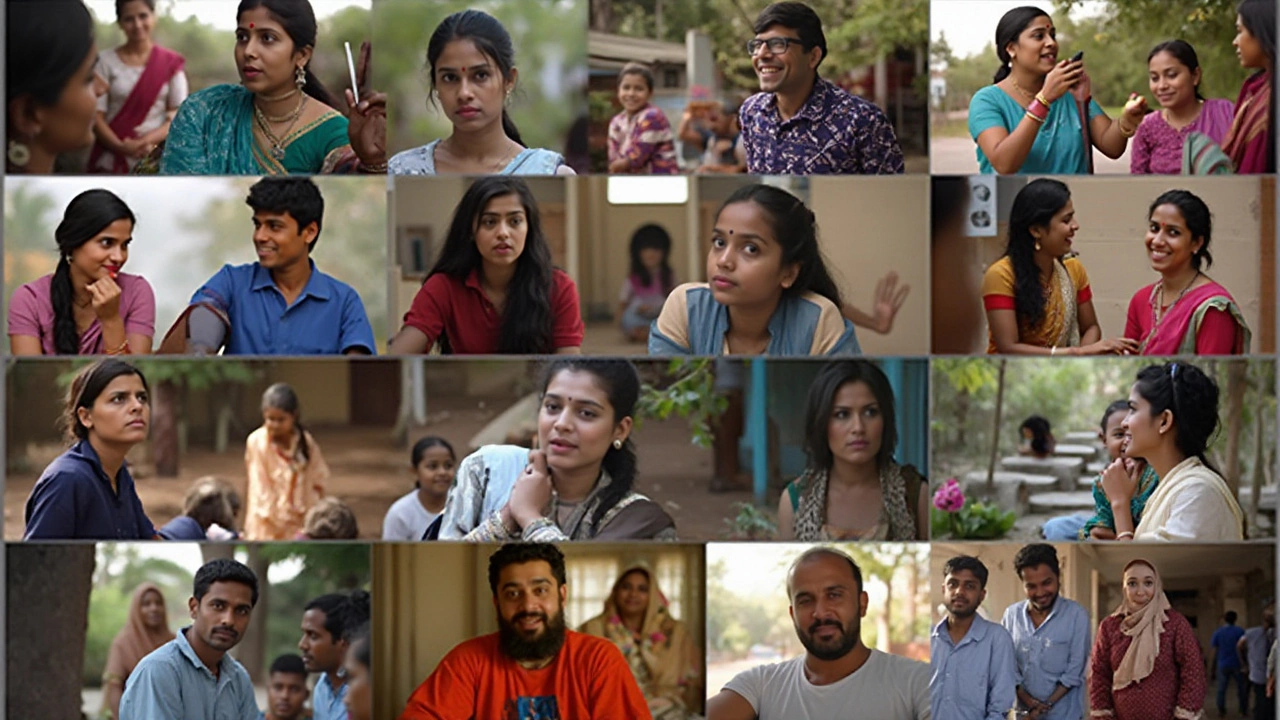English is more than just a language in India; it's a bridge connecting the vibrant cultures within the country to the world beyond. Navigating this domain requires guidance from educators whose passion and dedication leave an indelible mark on their students. Among the teachers who have set new standards in English education, one stands out as a beacon of inspiration and excellence.
This article explores the journey and contributions of India's most famous English teacher, unveiling the unique teaching methods and philosophies that have not only captivated students but also redefined English learning in the country. Join us as we traverse the success story of this remarkable educator and understand the profound impact they have had on shaping proficient English speakers of tomorrow.
- The Rise of English Education in India
- Spotlight on India's Leading English Educator
- Teaching Techniques and Contributions
- Impact on Students and Future Aspirations
The Rise of English Education in India
English education in India has witnessed a fascinating transformation over the decades. In a country renowned for its cultural and linguistic diversity, the adoption of English as a major language of instruction has woven a unified fabric that many credit as a driving force for India's global engagement. Historically, English found its way into the Indian education system during the British colonial era, when institutions like the University of Calcutta were among the earliest to adopt the language as a medium of higher education. As the world evolved, so did the perception of English, transitioning from just a colonial remnant to a prestigious asset that equips individuals for the global stage.
The importance of English education became particularly pronounced with the liberalization of the Indian economy in the early 1990s. This shift led to an increased demand for English proficiency, as multinational companies set up operations across the country, bringing with them new job opportunities that required communication skills in the global lingua franca. English fluency emerged as a significant advantage in the job market, leading many parents across the country to enroll their children in English-medium schools. This drive ushered in a new era where state governments began including English in their curricula from the primary level.
Further magnifying this trend was the role of technology and the internet, as the digital age demanded English proficiency to navigate vast online resources and tap into global knowledge. Popular online platforms offering English courses burgeoned, catering to students and professionals alike, and bringing about a democratization of English learning. As a result, India climbed to be one of the largest English-speaking populations in the world, a testament to the effective assimilation of the language into everyday life and professional spaces. In a research paper published by the British Council, it's noted that "English is a valued skill that stands as a testament to India's capacity to adapt and excel in a globally connected world."
Today, India's educational landscape is peppered with institutes and courses dedicated to English education. Institutions like the British Council and the many English teaching institutes scattered across metropolitan cities have become household names. The success of these centers lies in their ability to blend traditional instructional methods with innovative practices, ensuring students not just learn English, but think in it, too. This has been pivotal in crafting an environment where every aspiring professional can convey their thoughts seamlessly, irrespective of regional language barriers. A quick glance at educational statistics reveals the widespread embrace of English courses, with millions enrolling each year.
The rise of English education in India is one of aspiration and accessibility, where language no longer represents a constraint but an opportunity. As education policies continue to evolve, and technology further brings innovative teaching methods to remote corners of the country, the hope is that English education becomes more inclusive, setting a stronger foundation for the future generations. The journey is still unfolding, yet one thing is certain: English education in India has stood the test of time, continually shaping individuals who are not only confident communicators but also global citizens.

Spotlight on India's Leading English Educator
Delving into the heart of India's vibrant educational landscape, it is difficult not to notice the towering presence of Sunita Kapoor. Known for her dynamic approach to teaching, Sunita has captivated students across the nation with her innovative methods in English language instruction. Her journey began modestly in the bustling city of Mumbai, where she first realized the transformative power of the English language in a multilingual society. Her early career was marked by her relentless pursuit of educational excellence, not just as a personal goal but as a mission to elevate the standards of English education in India.
Sunita Kapoor is celebrated not just for her unmatched pedagogy but also for her unwavering commitment to inclusivity in education. She believes that English should be accessible to all, regardless of socio-economic backgrounds, and this belief has fueled her initiatives to provide free comprehensive resources and scholarship opportunities to underprivileged students. Her classes are not just about grammar and vocabulary, but a rich tapestry of cultural exchanges, spirited debates, and profound learning experiences. Her unique teaching techniques often include the use of storytelling, drama, and music, which turn traditional learning into an engaging journey. This blend of creativity and education has undoubtedly placed her at the forefront of the best English courses available in India.
What sets Sunita apart is her interactive style of teaching, where she encourages students to participate and lead discussions, fostering a sense of ownership over their learning process. She believes in nurturing a student's curiosity, steering away from rote learning, and guiding them towards a deeper understanding of the language. Her classes are known for their lively atmosphere, where every student feels heard and valued. This personalized approach has resonated with thousands of her students who not only excel academically but also develop a lasting love for the language. Her methods have significantly contributed to shaping confident English speakers across the nation.
"Education is not the filling of a pail, but the lighting of a fire," a philosophy often quoted by Sunita to inspire her students, originally by the poet W.B. Yeats. It embodies her teaching ethos, where the emphasis is on sparking enthusiasm and a lifelong love for learning.
Over the years, Sunita's reputation as a legendary educator has attracted accolades from national and international forums. Her workshops, seminars, and educational programs have been instrumental in setting benchmarks in the field of English teaching. She has been a pivotal force in transforming how English is taught in schools, integrating technology and new-age methods to stay relevant to today's educational demands. Undoubtedly, her legacy is one of empowerment, inspiration, and dedication, making her a guiding light for aspiring educators and a cherished mentor to her students.

Teaching Techniques and Contributions
When you think of exceptional educators in India, particularly in the realm of English learning, this notable teacher's methodologies come to mind. Their approach to teaching is as dynamic as it is effective, having crafted lessons that break from the traditional mold. A firm believer in interactive learning, this educator employs a variety of innovative techniques to ensure every student is engaged and able to absorb the material. One technique that stands out is the use of storytelling. By weaving intricate narratives into lessons, students are not only captivated but also able to understand and retain complex concepts more effectively.
The teacher also integrates technology seamlessly into the classroom, utilizing digital platforms to create a hybrid model of learning. This approach was particularly pronounced during the pandemic, when remote learning became a necessity. Virtual classrooms, enriched with multimedia resources, allowed students to access lessons at their own pace, accommodating diverse learning styles. This adaptability has been instrumental in maintaining high educational standards and outcomes.
"Education is not the filling of a pail, but the lighting of a fire," a quote succinctly capturing this teacher's philosophy, attributed to W.B. Yeats, highlighting the transformative power of passionate teaching.
The teacher's contributions extend beyond classroom walls, having authored several textbooks that are now core materials in schools across the country. These texts are famed for their accessibility and depth, making them invaluable resources for both students and fellow educators. Renowned for hosting numerous workshops and seminars, they continually share insights and strategies with aspiring educators, ensuring the ripple effect of their knowledge benefits future generations. Their commitment to fostering community and sharing knowledge is as commendable as their teaching prowess.
Impactful Techniques
The educator relies heavily on active discussion methods and encouraging debates among students, which facilitates critical thinking and boosts confidence. By implementing role-playing scenarios, learners get to practice real-world conversations, an exercise which boosts both their language skills and their cultural understanding. This technique is particularly beneficial in preparing students for opportunities beyond national borders.
Moreover, the teacher has developed a keen focus on listening skills as these are often underemphasized in conventional English teaching. Weekly listening sessions involving diverse English accents and dialects give students a rounded comprehension of the language as it is used globally. Their unique approach dismantles the idea that English is monolithic and presents it as a vibrant spectrum of accents and colloquialisms. This inclusion of varied language inputs ensures students are not only learning English but are fluent and prepared to engage in any environment. This style truly makes a difference in the way students perceive and utilize their learning experience of the English language.

Impact on Students and Future Aspirations
The influence of India's most revered English educator reaches far beyond the confines of traditional classrooms. Through immersive and innovative teaching methods, this famous English teacher in India has reshaped how students perceive and learn the language. Students often highlight the transformational nature of their educational journey, attributing their newfound confidence and communication skills to this educator's insightful approach. The real-world implications are vast, with many pupils securing prestigious positions in multinational corporations, excelling in international studies, and even becoming educators themselves, thus bridging cultural and linguistic gaps.
This success is not a mere coincidence. By implementing a curriculum that's attuned to contemporary yet timeless needs, the teacher ensures each session is packed with relevant insights and unapologetically challenges students' limits. This nurturing environment creates a fertile ground for growth, making learning both engaging and purposeful. One learner shares, "It felt like more than just a class; it was a door opening to the world." Every class gives students a toolkit not just for language, but to think critically and engage meaningfully with global audiences, significantly enhancing the English learning experience in India.
The educator's commitment to advancing English courses in India also extends into future aspirations. By encouraging robust interaction and promoting independent thought, students are not only better equipped linguistically but also poised as leaders of tomorrow. Many have shared the vision of returning as mentors or initiators of similar educational projects, inspired by the teacher's dedication. To capture this full-circle moment, alumni often visit to recount stories of their achievements, gaining fresh perspectives while re-acquainting with this nurturing academic milieu. The ongoing ripple effect of such impactful teaching continues to reshape the country's education landscape, one motivated student at a time.
Statistics reveal that students who have learned under the wings of this top language educator achieve higher success rates in competitive exams and college admissions. As illustrated in a recent alumni survey:
| Aspect | Result |
|---|---|
| Improved Job Opportunities | 85% |
| Enhanced Communication Skills | 90% |
| Higher Exam Scores | 87% |
"A teacher's purpose is not to create students in their own image, but to develop students who can create their own image," aptly summarized by the celebrated academic and author Ella Ward. This statement rings profoundly true in the life-altering impact this educator has on their students, fostering a journey of lifelong learning and admirable personal growth.




